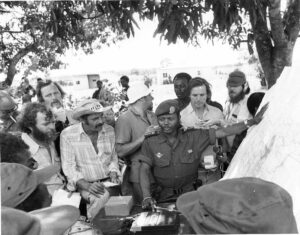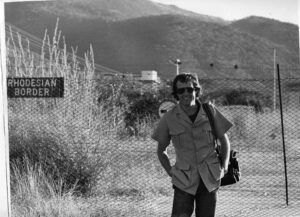GOING OUT OF FOCUS
Darwin’s theory of evolution applies as much to humans and technology as it does to animals and Nature. But some things are so rooted in cultures, minds and memories that their passing seems to border on travesty, irrational though that may be. The demise of the BBC radio’s “Focus on Africa” represents that for me.
When I was a neophyte foreign correspondent roaming Africa for the Argus Africa News Service in the latter half of the 1970s’, there were two essential pieces of kit; a trusty portable (in my case Olympia) typewriter, and a small Sony shortwave radio to tune into “The Beeb” every day. The unmissable programme was “Focus”.
In those bygone (and for some of us much-missed) days in Africa, getting a phone call through to your news desk was hit and miss at best. There was no Internet and no 24-hour news channels running in every hotel room and bar.

The only way to get an up-to-date and relevant handle on what was going on outside your immediate range of vision was short wave radio. The static, squeaks, whistles and squeals that punctuated reception were only fixable, if at all, by changing the radio’s location, which as often as not meant holding it up in the air.
When I forsook a salary for the freedom of freelancing, “Focus on Africa” became the jewel of my eight “strings” (prestige-wise, not monetary).

After I phoned in my first offer, a producer, who by his voice was an old school ‘Beeb’ man, came on the line. The conversation as I recall it went like this:
“Yes. Good. The content is exactly what is required for the BBC.” Pause. “Do you, by any chance, do American radio too?”
“Yes. I string for Mutual News.” (Twenty-five second spots, speak as fast as you can and still be coherent for $40 a pop.)
“I thought so,” the producer said. “The delivery, you see, is a tad quick for the BBC. Would you mind awfully trying it again?”
‘Trying it again’ was repeated several more times, and then: “Yes. That’s it. You’ve got it. For guidance, when you’re doing BBC radio, try to imagine that on the other side of the microphone you’re speaking to someone who may have trouble keeping up. And given your experience of the last ten minutes or so, I don’t suppose you’ll find that difficult, will you?”
A delightful man, a wonderful lesson. Whenever I hear news readers and correspondents saying “thee” or a hard “a” before a consonant, uttering sentences without verbs and other such ungrammatical travesties, I am acutely aware that he has no modern equivalent.
THE INDISPENSABLE
“Focus on Africa” debuted in 1960, the same year 17 African countries gained their independence from colonial rule.
In a lament on the demotion of “Focus” from scheduled broadcast to podcast, multi-award-winning Liberian journalist Rodney Sieh noted that what began as a weekly experiment “would later evolve into arguably the most important live-radio show in Africa, highlighting the good, the bad and the ugly of an emerging continent.”
Everyone who was anyone in African politics wanted to be on “Focus”, especially revolutionary leaders in exile, who realised that whether or not they liked dealing with what to many represented a “colonial power”, it was arguably the most credible and wide-ranging way to get their side of the story told.
Press conferences by Joshua Nkomo, the corpulent giant who led the Zimbabwe African Peoples Union (ZAPU) from a base near Lusaka, Zambia, often began with a version of this:
NKOMO: “Where is BBC? I will not start without them.”
BBC CORRESPONDENT JOHN BORRELL: “Here, Mr Nkomo.”
NKOMO: “Ah. Good. Make sure you tell the truth this time.” And with a bang of his signature walking stick for emphasis, the presser would officially begin.
BAD TIMING
Predictably, BBC executives cited budgetary constraints for the fate of “Focus”, and pledged to continue to etc.…etc…
Even if they are taken at their word – which the current state of the news business in general requires a giant leap of faith – I would argue that abandoning an institutional broadcast, assuming it can be replaced by slotting it into the increasingly over-crowded world of podcasts, amounts to an abrogation of responsibility to loyal listeners. That’s especially true when that audience is in the part of the world where Internet penetration stands at 43 percent, well below the global average of 66 percent.
In his work Historia Naturalis, the Roman writer Pliny the Elder (ad 23–79), wrote; “Africa always brings something new”, a reference to hybridization in the animal population.
Efforts by Russia, China and the U.S. to win allies and influence in Africa are in effect “hybridizing” the entire continent into a battle zone of a new Cold War.
Sadly, the focus on their rivalry and its effects will no longer be as sharp and accessible as it would have been under “Focus”.
Comments are welcomed. Click CONTACT on the site header.
To receive e‑mail alerts to new posts, Click SIGN-UP on the header.
One thought on “GOING OUT OF FOCUS”
What a shame ‘Focus’ has been relegated to a podcast when Africa continues to be intriguing.
… You know the one about the solo pilot flying over ‘deepest darkest’ Africa. The engine fails, he crashes into the jungle and survives .. he is surrounded by a primitive tribe, one of whom says .. ‘Good morning sir, are you hurt?’ The pilot, dazed and amazed says .. ‘My god .. you speak english?!’
Whistle, crackle, beep .. ‘Yes sir .. whistle .. BBC shortwave!’
(I’ll let myself out)